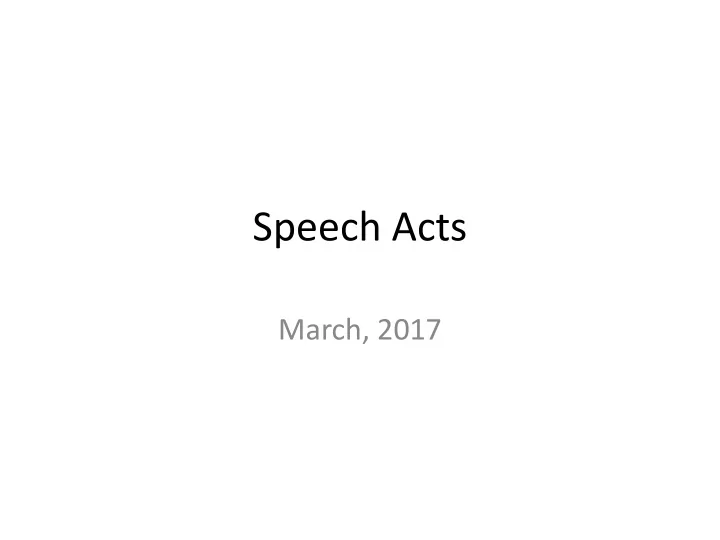

Speech Acts March, 2017
Examples of Speech Acts What you use language for • Statement • Statements have truth value; can be true or false – Conlanging is fun. • Question • It doesn’t make sense to say that a question, – What is your name? command, or promise is • Command true or false. – Wash the dishes! – Whether or not you • Promise promised can be true or – I will wash the dishes. false, but that is different • Lots more from the promise itself.
References • Wikipedia page about Austin: http://en.wikipedia.org/wiki/J._L._Austin • Wikipedia page about speech acts focusing on Searle: http://en.wikipedia.org/wiki/Speech_act • The Nespole! Interchange Format (technical report), Levin, Gates, Wallace, Peterson, Pianta, Mana. Available on the Web. • Dialogue Act Markup in Several Layers http://www.cs.rochester.edu/research/speech/damsl/RevisedManual/
Austin, How to do things with words • In addition to just saying things, sentences perform actions. • http://en.wikipedia.org/wiki/J._L._Austin • When these sentences are uttered, the important thing is not their truth value, but the felicitousness of the action (e.g., do you have the authority to do it). – I name this ship the Queen Elizabeth. – I take this man to be my husband. – I bequeath this watch to my brother. – I declare war.
Performative sentences • You can tell whether sentences are performative by adding “hereby”: – I hereby name this ship the Queen Elizabeth. – I hereby take this man to be my husband. – I hereby bequeath this watch to my brother. – I hereby declare war. • Non-performative sentences do not sound good with hereby: – Birds hereby sing. – There is hereby fighting in the Ukraine.
Austin continued • http://en.wikipedia.org/wiki/J._L._Austin • http://en.wikipedia.org/wiki/Perlocutionary_act • Locution: say some words • Illocution: an action performed in saying words – Ask, promise, command • Perlocution: an action performed by saying words, probably the effect that an illocution has on the listener. – Persuade, convince, scare, elicit an answer, etc.
Searle http://en.wikipedia.org/wiki/Speech_act • Quoting from Wikipedia: • “Searle (1975) [3] has set up the following classification of illocutionary • speech acts: assertives = speech acts that commit a speaker to the truth of the • expressed proposition, e.g. reciting a creed directives = speech acts that are to cause the hearer to take a particular • action, e.g. requests, commands and advice commissives = speech acts that commit a speaker to some future action, • e.g. promises and oaths expressives = speech acts that express the speaker's attitudes and • emotions towards the proposition, e.g. congratulations, excuses and thanks declarations = speech acts that change the reality in accord with the • proposition of the declaration, e.g. baptisms, pronouncing someone guilty or pronouncing someone husband and wife”
Searle • Indirect speech acts: – Can you pass the salt? • Has the form of a question, but the effect of a directive.
Examples of Speech Act inventories used in language technologies • These inventories are actually annotation schemes. • They are used for corpus annotation. • The corpus annotation is used for automated learning. • They are highly developed and checked for intercoder agreement. – But still take a long time to learn.
Task-Oriented Dialogue • Making travel reservations (flight, hotel room, etc.) • Scheduling a meeting. • Task oriented dialogues that are frequently done with computers: – Finding out when the next bus is. – Making a payment over the phone.
Domain-specific speech acts: travel scheduling (NESPOLE! Project) (a primitive version of the speech translation) app • 61.2.3 olang ITA lang ITA Prv IRST “Telefono per prenotare delle stanze per quattro colleghi” • 61.2.3 olang ITA lang ENG Prv IRST “I am calling to book some rooms for four colleagues” • 61.2.3 IF Prv IRST c:request- action+reservation+room (room-spec=(room, quantity=some), for-whom=(colleague, quantity=4)) • comments: dial-oo5-spkB-roca0-02-3
Examples of task-oriented speech acts • Identify self: – This is Lori – My name is Lori – I’m Lori – Lori here • Sound check: Can you hear me? • Meta dialogue act: There is a problem. • Greet: Hello. • Request-information: – Where are you going. – Tell me where you are going.
Examples of task-oriented speech acts • Backchannel: – Sounds you make to indicate that you are still listening – ok, m-hm • Apologize/reply to apology • Thank/reply to thanks • Request verification/Verify – So that’s 2:00? Yes. 2:00. • Resume topic – Back to the accommodations…. • Answer a yes/no question: yes, no.
Task-oriented dialogue acts related to negotiation • Suggest – I recommend this hotel. • Offer – I can send some brochures. – How about if I send some brochures. • Accept – Sure. That sounds fine. • Reject – No. I don’t like that one.
DAMSL Dialogue Act Markup in Several Layers • For task-oriented or non-task-oriented dialogue. • However, much of the development was related to task- oriented dialogues: – Trains corpus – Maptask corpus – Meeting scheduling corpus • Although it has been used for non-task-oriented dialogue: – Switchboard corpus (JHU workshop 1997) – Spanish CallHome corpus (Clarity Project, Waibel, Levin, Lavie) – Text message corpus (Proprietary project, Levin, Rudnicky, Tenny) • What are the layers? – Forward function: offer, ask – Backward function: backchannel, accept, reject
Forward looking functions Statement • – Assert – Reassert – Other-statement Influencing-addressee-future-action • – Open-option – Action-directive Info-request • Committing-speaker-future-action • – Offer – Commit Conventional Opening Closing • Explicit-performative • Exclamation • Other-forward-function •
Backward looking functions • Agreement – Accept – Accept part – Maybe – Reject part – Reject – Hold • Understanding – Signal non-understanding – Signal understanding • Acknowledge • Repeat • Complete – Correct misspeaking • Answer
Recommend
More recommend